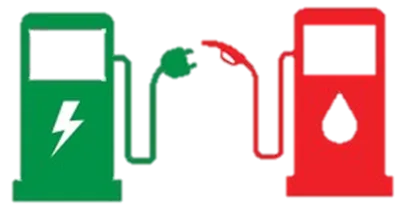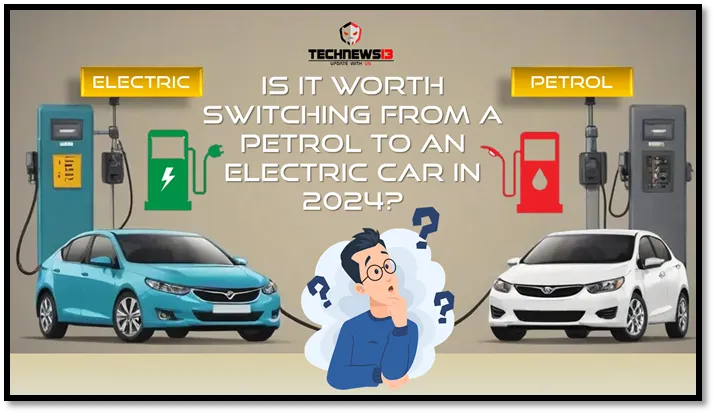Introduction
Hello friends, as I always asked you how are you all readers? I hope you’re fine and doing well. I’m your info friend Sandeep, and I’m back with my 8th blog which is going to be on whether is it worth switching from petrol to an electric car in 2024.

In the rapidly evolving landscape of electric vehicles, the market for electric automobile industries has witnessed massive growth in future. So people have the same question in their mind when they going to buy a new car. And that question would be is this a good time to switch to electric vehicles or do we need to stick with the older choice of all-time petrol vehicles? The year 2024 has changed into a new era for the automobile world, with the new trend of electric cars gaining important attention from all over buyers. As we stand at this crossroads of technological development. Let's find out the journey through the different sides that shape this decision. Before we move ahead if you come here it means you like my introduction and enjoy reading my blogs, please request you to share your valuable thoughts in the comments section and share my article with your friends and family on social media. Your support will greatly contribute to the growth of this website. I look forward to your response. You can also join the WhatsApp group to receive the latest tech updates from all sectors.

Questions In Our Mind
When we start searching for a vehicle 1st or 2nd time we have some questions in mind which are as follows. and we must ask this question ourselves as well to know our needs perfectly
Question in mind for First-Time Vehicle Buyer:
| Budget-related Questions: | How much can I afford to spend on a vehicle? |
| What funding options are present for first-time vehicle buyers? | |
| Usage and Lifestyle: | What type of driving will I primarily be doing (commuting, long trips, off-road)? |
| How many travellers and how much storage capacity will be necessary? | |
| Fuel Efficiency and Costs: | What are the fuel efficiency ratings of different types of vehicles? |
| What should I expect in terms of expenses for fuel or charging? | |
| Vehicle Maintenance and Repair cost: | What is the maintenance expenses linked to various vehicle types? |
| How often does the vehicle require servicing? | |
| Safety Features: | What safety features are essential for my peace of mind? |
| What are the crash test performances of various vehicles? | |
| Insurance: | How much will insurance cost for different types of vehicles? |
| Do new drivers have specific insurance factors to consider? | |
| Vehicle Maintenance and Repair Cost: | What tech features are important to me (infotainment, connectivity, driver assistance)? |
| How user-friendly is the vehicle’s technology interface? | |
| Resale Value: | How does the resale value of different vehicles compare? |
| Are there certain brands or models that hold their value better? | |
| Environmental Impact: | How important is environmental sustainability to me? |
| Are there eco-friendly options within my budget? | |
| Test Driving Experience: | Have I test-driven multiple vehicles to get a feel for different driving experiences? |
| What are the maintenance expenses linked to various vehicle types? |
The question in mind Before Switching from a Petrol Car to an Electric Car:
| Charging Infrastructure: | What is the availability of charging stations in my area? |
| How does the charging infrastructure impact my daily routine? | |
| Range and Charging Time: | How far can the electric vehicle go on a single charge? |
| What is the charging duration for the electric vehicle, and does it align with my lifestyle convenience? | |
| Total Cost of Ownership: | What are the total costs associated with owning an electric vehicle compared to a petrol car? |
| Do electric vehicles qualify for government incentives or rebates? | |
| Battery Life and Replacement: | How long does the battery typically last in an electric vehicle? |
| What are the expenses for battery replacement, and does it fall under warranty coverage? | |
| Performance and Driving Experience: | How does the performance of electric vehicles compare to petrol cars? |
| Is the driving experience enjoyable, and does it meet my expectations? | |
| Environmental Impact and Sustainability: | How does the carbon footprint of an electric vehicle compare to a petrol car? |
| What is the overall environmental impact of manufacturing and disposing of the vehicle? | |
| Resale Value of Electric Cars: | How do electric cars hold their value in the resale market? |
| Are there differences in resale value compared to petrol cars? | |
| Public Perception and Consumer Reviews: | What do other owners say about their electric vehicles? |
| How is the public perception of electric cars evolving? | |
| Maintenance and Repair Costs: | How do maintenance and repair costs for electric cars compare to petrol cars? |
| Do electric vehicles require special considerations for maintenance? | |
| Government Policies and Incentives: | What government policies support electric vehicle adoption? |
| Are there additional incentives or benefits for driving an electric vehicle in my region? |
Environmental Impact
When it comes to the environment, electric cars are often praised for their lower carbon emissions compared to traditional petrol vehicles. The electric cars are cleaner ride contribute to reducing air pollution, a significant win for our environment.
Role of EVs in Reducing Air Pollution
Electric vehicles play an important part in combating air pollution. Zero tailpipe emissions help to enhance the air quality in metropolitan areas, creating a healthier environment for everyone. which is any time better for us.
Adopting Sustainable Practices
The automotive industry is shifting towards sustainability, with electric cars leading the charge. As we switch to cleaner technologies, we contribute to a greener and more sustainable future.
Technological Advancements
Evolution of Electric Car Technology
The technology behind electric cars has evolved significantly in recent years. Improved battery efficiency, enhanced range, and better performance have made electric vehicles a viable option for everyday use.
Battery Advancements
Advancements in battery technology have addressed one of the key concerns – range anxiety. Modern electric cars boast impressive ranges, making them suitable for long journeys and daily commutes alike.
Charging Infrastructure Improvements
The charging infrastructure is expanding rapidly. With more charging stations becoming available, the inconvenience of finding a charging point is gradually diminishing, making electric cars more practical for daily use.
Economic Considerations
Total Cost of Ownership Analysis
While the initial cost of electric cars may seem higher, a comprehensive analysis of the total cost of ownership often reveals surprising results. Lower maintenance and charging costs can make electric cars more economical in the long run.
Government Incentives
Governments worldwide are incentivizing the switch to electric cars. Subsidies, tax credits, and other perks can significantly reduce the financial burden, making electric vehicles an attractive option for budget-conscious consumers.
Long-Term Savings
Considering the rising cost of petrol and the decreasing price of renewable energy, electric cars offer long-term savings. The investment in an electric vehicle can pay off over time, contributing to a more sustainable and cost-effective lifestyle.
Range and Performance
Electric Car Range in 2024
In 2024, electric cars have overcome the limitations of their earlier counterparts. With extended ranges, electric vehicles can now compete with petrol cars, providing the reassurance needed for longer journeys.
Performance Comparisons
Modern electric cars are not just environmentally friendly; they are also high-performing vehicles. Instant torque and smooth acceleration contribute to a pleasant driving experience, challenging the traditional notions of electric cars as slow and cumbersome.
Advantages and Challenges
While electric cars offer numerous advantages, there are still challenges to consider. Limited charging infrastructure in some areas and the time required for a full charge remain factors that need attention. However, advancements are continuously being made to address these issues.
Charging Infrastructure
Availability and Accessibility
The growth of charging infrastructure is a testament to the increasing popularity of electric cars. As more charging stations become available, the concern about finding a place to charge is gradually becoming a thing of the past.
Technological Innovations
Charging technology is evolving rapidly. Fast charging stations, improved battery technology, and smart charging solutions are making the charging process more convenient and efficient.
Addressing Concerns
Despite improvements, concerns about charging infrastructure limitations persist. Addressing these concerns is crucial for widespread electric vehicle adoption. Continued investment and innovation are key to making electric cars a viable option for all.
Market Trends
Growth of the Electric Car Market
The electric car market is experiencing significant growth. More automakers are entering the electric vehicle space, offering consumers a wider range of choices. This trend reflects a shift in consumer preferences towards sustainable and eco-friendly options.
Consumer Preferences
Consumer attitudes are changing. Surveys and studies indicate a growing interest in electric cars, driven by environmental consciousness, lower operating costs, and government incentives. Understanding these preferences is crucial for the automotive industry to meet evolving consumer demands.
Impact of Industry Shifts
The automotive industry is transforming. As electric cars gain popularity, traditional manufacturers are adjusting their strategies to embrace the shift towards cleaner and more sustainable transportation.
Government Policies and Regulations
Current Regulations
Government regulations play a significant role in shaping the automotive industry. Understanding the current regulatory landscape for both petrol and electric vehicles is essential for consumers and manufacturers alike.
Future Policies
Anticipating future policies is crucial for making informed decisions. Governments worldwide are likely to introduce more incentives and regulations to promote the adoption of electric vehicles and reduce the environmental impact of transportation.
Government Initiatives
Governments are actively promoting electric vehicle adoption through various initiatives. Investments in charging infrastructure, tax incentives, and policy changes are aimed at accelerating the transition to cleaner transportation.
Consumer Perspectives
Attitudes Towards Electric Cars
Consumer attitudes towards electric cars are evolving. While concerns about range, charging infrastructure, and initial costs remain, awareness and positive experiences gradually change perceptions.
Addressing Concerns
Understanding and addressing consumer concerns is essential for widespread electric vehicle adoption. Clear communication, education, and improvements in technology and infrastructure are key to overcoming barriers to entry.
Decision-Making Factors
Consumer decisions to switch to electric cars are influenced by various factors. Understanding these factors, such as environmental impact, cost savings, and driving experience, is crucial for automakers and policymakers.
Conclusion
As we navigate the roads of the future, the decision to switch from petrol to electric cars in 2024 is influenced by a combination of environmental considerations, technological advancements, economic factors, and consumer preferences. While challenges and concerns persist, the overall landscape suggests that the shift towards electric vehicles is gaining momentum. Making an informed decision requires weighing the pros and cons, understanding the evolving market trends, and staying informed about government policies and industry developments.
In conclusion, the question of whether it’s worth switching from petrol to an electric car in 2024 is a complex one, but with the right information and considerations, consumers can contribute to a more sustainable and eco-friendly transportation future.
FAQ
Q: What is the driving range of an electric vehicle?
The driving range of electric vehicles varies, but modern models typically offer ranges between 100 to 300 miles on a full charge.
Q: How long does it take to charge an electric vehicle?
A: Charging times depend on the charging infrastructure and the vehicle model. Standard home chargers may take several hours, while fast chargers can provide a significant charge in 30 minutes to an hour.
Q: Are there government incentives for purchasing an electric vehicle?
A: Yes, many governments offer incentives such as tax credits, rebates, and reduced registration fees to encourage the adoption of electric vehicles.
Q: What is the maintenance cost of an electric vehicle compared to a petrol car?
A: Generally, electric vehicles have lower maintenance costs due to fewer moving parts and no oil changes. Routine maintenance is often limited to brake and tyre replacements.
Important Links
| Official Website | Links |
| Other Important Articles | Click Here |
| Join Our WhatsApp Group For Daily Updates | Click Here |
Our Latest Published Articles
- Amazing offer Top 5 Tech Gadgets You Need that are priced under ₹700.
- top 5 mobiles under 15000 with the best camera in April 2024 with brands Xiaomi, Samsung and Realme
- Beware of BIG WhatsApp Scam Calls: Protect Yourself from Fraudsters in 2024
- Discover the Best AI Image Generator for Free in 2024! Revolutionize Your Big Designs.
- How to Change Aadhar Mobile Number | Step-by-Step Process to Update Mobile Number in 2024.





